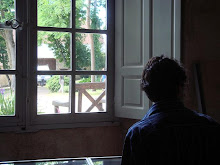La Dolce Vita
La Dolce Vita - one of the richest, most impressive films I have ever seen - is suffused with the falsities of our society that are relevant now more than ever in our current age. The main character's reckless, self-destructing egoism wraps up the people around him in a bouquet of desperation. A review however would not only be superfluous, it would be somewhat too asphyxiating for me here, and thus I won't pursue anything of this kind.
It is the character of Steiner that fascinates me. On a profound level, it is him who is actually living the 'dolce vita', in contrast to Marcello's affected persona. He is seemingly the ideal family man of strong, sacred values and he is likewise materially endowed with a great home of palatial atmosphere, which is constantly an enchanting venue for the gatherings of formidable and some not so formidable representatives of the intelligentsia. Despite this ostensible perfection which smiles at him from every corner, he confesses in a bleak, cautious tone to his friend Marcello:
"Sometimes at night the darkness and silence weighs upon me. Peace frightens me; perhaps I fear it most of all. I feel it is only a façade hiding the face of hell. I think, `What is in store for my children tomorrow?' `The world will be wonderful,' they say. But from whose viewpoint? If one phone call could announce the end of everything? We need to live in a state of suspended animation like a work of art, in a state of enchantment. We have to succeed in loving so greatly that we live outside of time, detached."
His success and his family do mean the world to him, yes. But in the depths of his internal anguish, he becomes aware that while he is gracefully putting his children to bed, that very same world plans vengeance on him. The serenity and peace of his social existence is the disquietude and turmoil of his personal life- solitude is what unites together these two realms of his consciousness. He is frightened by it all: by the Cold War, the intrigues and tensions upon which his era is founded; by his bourgeois existence which threatens his honesty; by the sheer spiritual discomfort which has stripped his convictions of anything which is not directly concerned with the ephemeral. All this foreboding leads him to the monstrosity of killing his beloved children and committing suicide.
It is incomprehensible to the ordinary person how this calm, collected, erudite, blessed man could drive himself to such despair because of the intense fear conjured up by the false security of his 'perfect' life. His sole conviction is one of anxiety; and that very same conviction forcibly overwhelms his love for his family - one of the most sinister connotations of the film.
Is Steiner not the symbol of the paroxysmal pleasaunce which society itself has taken to in its blindfolded search for the 'dolce vita'? He became a monster before becoming a martyr. In the process of him bartering his humanity for tranquility, he lost both.
In Antarctica - a land still mysterious, remote and enigmatic as ever - the ghost of the great explorer Robert Falcon Scott who perished there frostbitten and starving, is said to roam the desolate sheets of ice of the continent, greeting expeditioners on their way to the South Pole. In our civilized land of dissipation, the ghost of Steiner is there greeting us with open arms to embrace us, before he shoots in our direction.


0 Comments:
Post a Comment
Subscribe to Post Comments [Atom]
<< Home